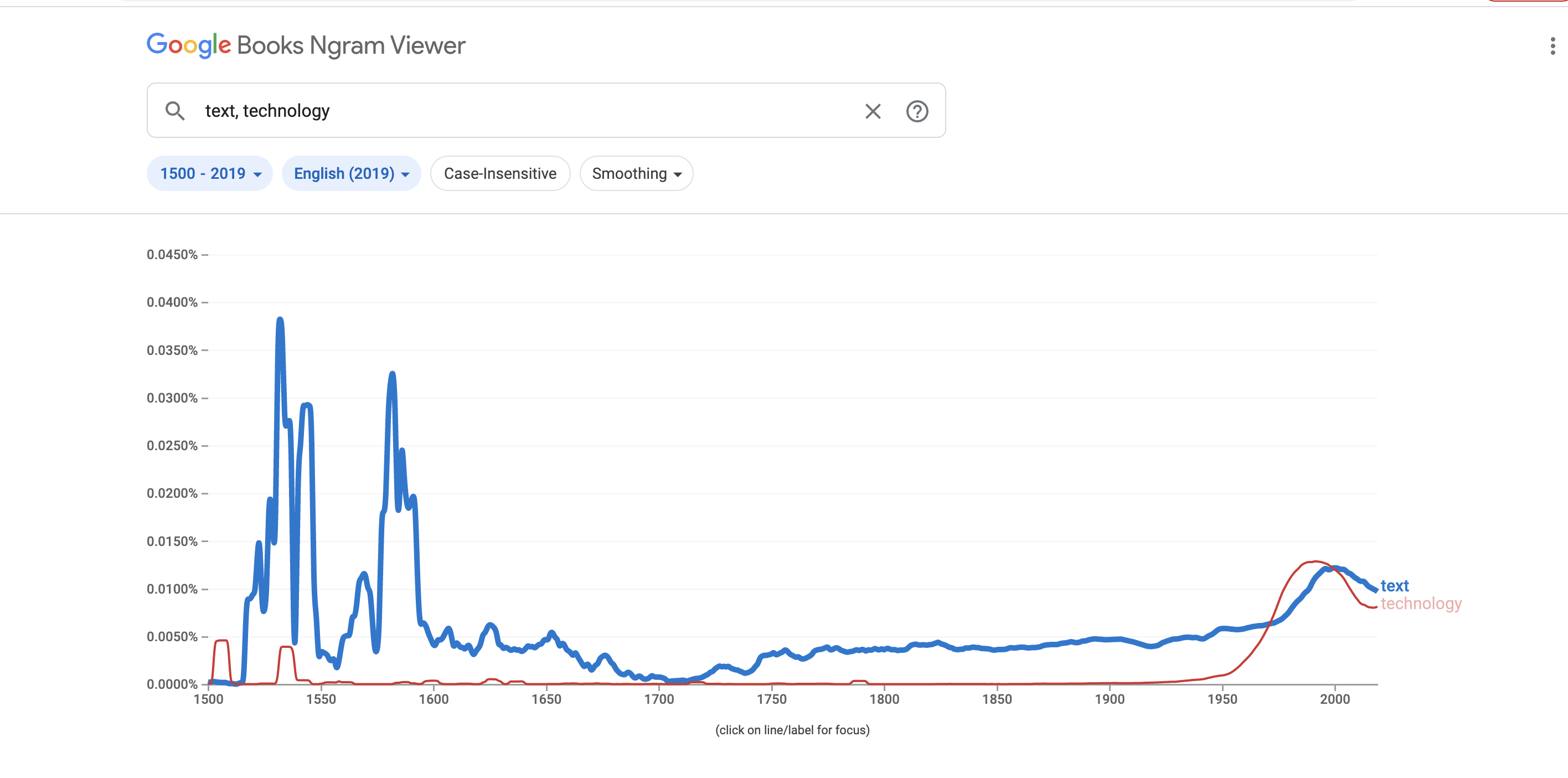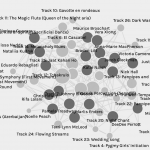What do the words Text and Technology mean to you?
When I hear the word “text”, words such as books, manuals, manuscripts, papyrus, and a Bible come to my mind. In other words, I think of written work in different forms. These words bring back memories of my history classes in primary school in Ukraine where I have been fascinated to learn how people were first inventing paper and tools for writing and recording oral languages and traditions. This has allowed them to preserve information and knowledge in a paper format and pass it down from generation to generation. I know that many First Nations societies these days treasure oral traditions the most and it is part of their culture. In their worldview, not everything needs to be recorded on paper. This makes me wonder whether there are more advantages and disadvantages to text as a written form? On one hand, paper can burn yet these days people have learned to preserve it quite well. On another hand, it does not capture traditions of oral societies and can be argued to be useless in that sense. This leads me to the next keyword, “technology”. I associate this word with such words as modern, innovative, and fluid. The text takes a different form once it is used with the help of technology. It becomes digital… PDF, Word document, SGML – you name it! Technology transforms our old understandings of the text and takes them to a new level. It bridges generations, societies, and cultures.
2. Listen to The Word Guy’s episode on Internet Age Words
What an interesting episode that looks at words from an epistemological and historical perspective. I have decided to consult the Online Etymology Dictionary and research some of the words and their origins related to technology. Here are some interesting findings I have come across:
- FaceBook (n.) – directory listing names and headshots, by 1983, originally among U.S. college students, from face (n.) + book (n.). The social networking Web site of that name (with capital F-) dates from 2004.
- Unfriend (v.) – in the Facebook sense, attested from November 2007, from un- (1) “not” + friend (v.). Unfriended is at least as old as Shakespeare in the sense “friendless.” A noun unfriend “enemy” is recorded from late 13c., chiefly in Scottish, and was still in use in the 19th century.
-
Tweet (n.) – 1845, imitative of the sound made by a small bird. As a verb by 1872. Related: Tweeted; tweeting. As the word for what one does on the Twitter microblogging service, by 2007. -
Tab (n.) – 1961, shortened form of tablet (especially one of sugar containing LSD). As an abbreviation of tabloid (newspaper) it is 1990s slang. As a short form of tabulatorkey of a typewriter (later computer) it is recorded from 1916.
3. Search the OED for formal definitions and etymology
- Text – The wording of anything written or printed; the structure formed by the words in their order; the very words, phrases, and sentences as written.
- c1400 (▸?c1390) Sir Gawain & Green Knight (1940) l. 1515 F[or] to telle of þis teuelyng of þis trwe knyȝteȝ, Hit is the tytelet token & tyxt of her werkkeȝ.
- c1400 (▸?c1380) Cleanness l. 1634 Fyrst telle me þe tyxte of þe tede lettres.
- c1500 Melusine (1895) xii. 45 They delyuered to Raymondyn the ground that was gyuen to hym after the texte or tenour of hys lettres.
- 1560 J. Daus tr. J. Sleidane Commentaries f. lxvv For those wordes.., this is my body, Luther vnderstode barely and symply after the texte of the letter.
- 1678 R. Cudworth tr. Plutarch in True Intellect. Syst. Universei. iv. 240 The most of Plato’s Followers..offering all kind of violence to his Text.
- 1728 J. SwiftTo Stella in J. Swift et al. Misc. Last vol. 296 Say, Stella, when you copy next, Will you keep strictly to the Text?
- 1888 J. BryceAmer. Commonw. II. liii. 326 Without venturing to propose alterations in the text of the Constitution.
- Textile – That has been or may be woven. Also, of or pertaining to a man-made fibre or filament, not necessarily woven.
1656 T. BlountGlossographia Textile,..that is weaved or wounden, embroidered.1755 S. JohnsonDict. Eng. Lang. Textile,..woven; capable of being woven.1852 W. J. Conybeare & J. S. HowsonLife & Epist. St. Paul II. xx. 226 The wine and the textile fabrics of Cos.1868 J. E. T. RogersMan. Polit. Econ. viii. 73 Cotton and wool and other textile materials..from all quarters.1910 Mitchell & PrideauxFibres used in Textile & Allied Industries i. 8 Textile papers. (a) Spinning fibres in raw state… (b) Cotton or flax fibre previously spun.1931 K. P. HessTextile Fibers & their Use v. 232 The fourth method of dissolving cellulose and forming it into fine filaments was worked out… Textile fibres were not developed to any great extent by this method until the close of the World War.1961 Wall St. Jrnl. 23 Jan. 2/3 DuPont Co. announced it will close its textile rayon operation..by August.1972 Daily Tel. 20 Nov. 11/4 One single step is..required to convert the chemical raw material of the synthetic fibres into a finished textile cloth, no weaving or knitting being required.1981 M. L. JosephEssent. Textiles ii. 9 Textile fibres..can be manufactured from natural fibrous materials such as wood pulp (rayon) or synthesized from chemicals with no resemblance to fibrous forms (nylon, polyester).
Texture – The process or art of weaving. Obsolete.
1447 O. BokenhamLyvys Seyntys (1835) 145 Mynerve hyr self wych hath the sovereynte Of gay texture, as declayryth Ovyde.1646 Sir T. BrownePseudodoxia Epidemica 256 Coats of skinnes..a naturall habit.. before the invention of Texture . View more context for this quotation1656 T. BlountGlossographia Texture,..a weaving.1726 E. Fenton in A. Pope et al. tr. Homer Odyssey V. xx. 87 Pallas taught the texture of the loom.
Technology – discourse or treatise on an art or arts; esp. (in later use) a treatise on a practical art or craft. Obsolete.In quot. 1612 perhaps: academic discussion or disputation generally.
1612 tr. I. Casaubon Answere Epist. Peron sig. A3v Men, void of Gods spirit, commonly and promiscuously did dispute of spirituall things, and conuert Theologie into technology, that is, make no other vse of Diuinity but as a matter of learned, or artificiall discourse, as they talke of other arts and sciences out of humane reason.1615 G. BuckThird Universitie of Eng. xlviii, in E. Howes Stow’s Annales (new ed.) 988/2 An apt close of this general Technologie.1628 T. VennerBaths of Bathe 9 Heere I cannot but lay open Baths Technologie.1706 Phillips’s New World of Words (new ed.) Technology, a Description of Arts, especially the Mechanical.1860 Vanity Fair (N.Y.) 7 Apr. 235/1 We have Classical Dictionaries, Dictionaries of Science,..Cyclopædias and Technologies without Number.Technical – Of a person: having knowledge of or expertise in a particular art, science, or other subject; skilled in the formal and practical techniques of a particular field. In later use chiefly: expert in or concerned with applied and industrial sciences.
1617 J. HalesSerm. Oxf. 19 Nor to think themselues sufficiently provided vpon their acquaintance with some Notitia, or systeme of some technicall divine.1655 T. PierceCorrect Copy Notes Gods Decrees iv. 67 And every technical Grammarian can distinguish the Act which is imply’d in the Participle, from the Aptitude which is couched in the Adjective in bilis.1790 T. W. ToneRev. Conduct Admin. 17 The Great Seal was merely a matter of form..which might satisfy the cautious doubts of technical men, but which to a strong mind and a clear understanding was of no further importance.1794 J. Trapp tr. D. H. Stoever Life C. Linnæus x. 262 The diction of a technical man could not surely be that of a Cicero.1817 J. MillHist. Brit. India III. vi. ii. 81 The managers..not being technical men.1897 A. Drucker tr. R. von Ihering Evol. Aryansiv. v. 360 All the branches of the pontifical duties may be traced back to the original demands laid upon the technical bridgemakers of the migratory period.1916 Burlington Mag. Apr. 5/1 The enthusiasm of a technical artist for a skilful practitioner shows itself very strongly.1926 Brit. Gaz. 12 May 3/2 At Basingstoke there is a supply of technical engineers available for work elsewhere.1961 G. MillersonTechnique Television Production 15 The technical director is in charge of the technical operational staff on the show.1998 N.Y. Times 19 July 18/1 Microsoft’s technical people think it’s completely obvious that an operating system in 1998 should include Web-browsing services. -
4. Graph the Usage of the terms over time with Google Ngram Viewer

The graph compares the occurrence of the words text and technology in the entire Google Books corpus from 1500 to 2019. Overall, the use of the word technology has increased over the period of time, whereas the use of the word text has declined. Particularly, from 1500 to 1600 the occurrence of word text has reached its peaks (~0.0350%) comparing to the year 2000 where it reached only 0.0100%. On the other hand, the occurrence of the word text has been fairly stable over the period of time reaching its highest points in 1500 at 0.0050% and in 1550 at 0.0050%, and later in 1950 reaching its peak at 0.0150%. When comparing the two words (text and technology), it is evident that the occurrence of the word text has been much higher than the occurrence of the word technology over the period of time.
5. Consider the following questions or come up with questions of your own
- What does the etymology of these words suggest about their inherent meanings?
Etymology studies the history of the words and their development. The word “technology” is closely related to the word art and craft, while the word “text” is derived from the words that describe the process or art of weaving; the structure formed by the words in their order. Just like the art of weaving, the wording of anything written or printed, in other words, “text” -ing, asks for a specific order and structure.
- What, for example, does textiles have to do with text?
Both of the words have the same root, “text”. The word textiles means “something that has or maybe woven” while the word “text” means “the wording of anything written or printed; the structure formed by the words in their order; the very words, phrases, and sentences as written”.
- How is technology related to text?
The word “technology” means “discourse or treatise on an art or arts; esp. (in later use) a treatise on a practical art or craft” while the word “text” means “the wording of anything written or printed; the structure formed by the words in their order; the very words, phrases, and sentences as written”. Both of the words are derived from the same root and relate to the art and structure of words.
References:
Google Ngram Viewer. https://books.google.com/ngrams
Online Etymology Dictionary. https://www.etymonline.com/
The Oxford English Dictionary. https://www-oed-com.ezproxy.library.ubc.ca/




